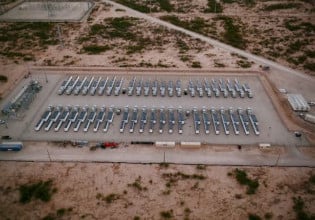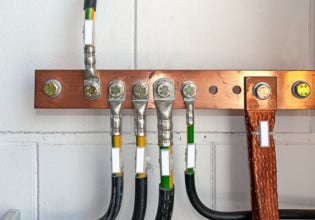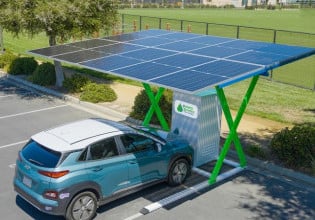Distributed Storage to Improve Reliability of Australian Electric Grid
Ergon Energy expects to be installing new battery-based technology called Grid Utility Support Systems (GUSS) to help power sections of its electricity network by mid-2015. The news comes with the announcement of S&C Electric Company winning an Ergon tender to provide 20 of the ground-breaking GUSS units. GUSS works by charging batteries overnight when electricity use is at its lowest and discharging them during the day if required when energy use peaks. Ergon expects to eventually install hundreds of these distributed storage nodes.
Ergon finalized a successful trial of prototype GUSS units in Far North Queensland last year and will now roll the systems out strategically to sections of SWER network. GUSS units could reduce SWER network augmentation costs by more than 35 per cent on current estimates. The first production units are expected to be built later this year. They will provide 25kVA and 100 kilowatt hours nominal capacity per unit, enough to power the average home for up to five days.
The units utilize a total of 50 Li-Ion type batteries and were developed by a team of Ergon engineers. Trials of the system since 2011 have proven the concept on Ergon's SWER network. In a further bonus for other new technologies, GUSS units will also help Ergon's network interact with customer solar PV installations more effectively and help avoid costly issues sometimes created by exported power from rooftop solar.
Ergon predicts it could be deploying many hundreds of GUSS units across its SWER network in coming years. Ergon operates around 65,000km of SWER network servicing more than 26,000 customers. SWER has proven to be a low cost and reliable way of servicing low customer densities in rural and remote communities throughout the state.
Designed, developed and proven by Ergon from an initial concept in 2006, the GUSS units are an advanced, cost effective technology solution that will improve the quality and reliability of electricity supply to rural customers on constrained single wire high voltage distribution voltage lines, known as SWER (Single Wire Earth Return).
"Traditional augmentation solutions to constrained SWER lines where demand on that line is exceeding its capabilities can cost in excess of $2 million" Ergon Chief Executive Ian McLeod said. "GUSS units are not only a quicker solution than traditional network augmentation, but the money we can save will ultimately put downward pressure on electricity prices."
Additionally customers on constrained networks who have had to limit their demand due to the available capacity may be able to access additional supply. "This is a first for Ergon and Australia," said McLeod. "This technology has been proven and made ready for real-world deployment without subsidies to Ergon which is also unique for this kind of technology.
"Using a battery-based system in place of traditional network augmentation will not only deliver better value for Ergon and customers, it will help drive similar technology and integration on the electricity network," Mr McLeod explained.
Discussing GUSS and future capabilities, Ian McLeod explains: "There is a commonly accepted theory that in the future we could be combining home storage of power connected to, and backed up by, the existing electricity network."
"When we talk about power "stored" at home, this could be through solar-charged batteries in your house, thermal storage such as hot water storage units or even your electric car connected at home," he said. "The process of sharing stored energy around existing networks presents challenges however, but GUSS is delivering many answers to this puzzle.
"Combining and sharing stored power across multiple customer premises around sections of electricity network is a solution to peak demand issues – a conundrum under examination in the electricity industry.
"If stored energy could be fed back into the network to help relieve peak demand on our network, this could mean less investment needed on infrastructure and hence less cost needed to be passed on to customers. GUSS represents a big step forward in Australian utilities' adoption of storage technologies," McLeod concluded.






